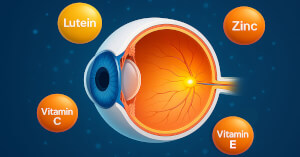
Vitamin E
Vitamin E is a potent antioxidant that protects cells from damage, supports skin health, and promotes immune function.
Vitamin E is a fat-soluble antioxidant that helps protect cells from oxidative damage and supports immune and skin health.
It exists in several forms, with alpha-tocopherol being the most biologically active. Vitamin E is found in nuts, seeds, and vegetable oils.
Vitamin E is used for cardiovascular health, skin repair, and antioxidant protection. High doses may interfere with blood clotting and should be used with care.
Other names & forms of Vitamin E supplement : tocopherol, alpha-tocopherol, d-alpha tocopherol, vitamin e supplement
Possible Benefits
As a powerful antioxidant family, Vitamin E offers skin, immune, and cardiovascular benefits:
- Helps maintain Skin Health by preventing lipid peroxidation and supporting skin barrier integrity.
- Supports Heart Health by preventing oxidative modification of LDL cholesterol and improving endothelial function.
- Contributes to Immunity by promoting natural killer cell activity and reducing inflammation.
- May aid in Anti-Aging by protecting cells from free radical damage and supporting cellular longevity.
Side Effects
Vitamin E supports antioxidant defenses and skin health, but excessive intake can lead to mild effects. Watch for:
- Occasional gastrointestinal upset, nausea or diarrhea
- Possible headache or dizziness at high doses
- Temporary mild fatigue or weakness
- Rare bleeding tendency due to anticoagulant effects
- Occasional blurred vision or double vision
Interactions
Possible interactions include:
- Anticoagulants: Vitamin E’s tocopherols can inhibit platelet function; when combined with warfarin or Garlic, monitor INR.
- Statins and cholesterol drugs: High-dose E may alter lipid metabolism; discuss combined use with omega-3s or statins.
Precautions
Before supplementing with Vitamin E, confirm none of the following apply to you. If they do, consult your healthcare provider:
- Individuals on anticoagulant or antiplatelet medications: Increased bleeding risk; monitor clotting
- People with clotting disorders: May exacerbate bleeding; avoid high-dose supplementation
- Those with vitamin K deficiency: Balance with vitamin K; consult your doctor
- Pregnant or breastfeeding women: Generally safe at RDA levels; avoid megadoses
- Patients scheduled for surgery: Discontinue high-dose use at least two weeks prior, potential bleeding and anesthesia interactions
Studies
These studies provide scientific insights into Vitamin E benefits:
A 2016 meta-analysis of 18 RCTs found vitamin E does not significantly reduce cardiovascular events or mortality in primary or secondary prevention .
A 2016 RCT in non-alcoholic fatty liver disease patients reported 800 IU/day for 96 weeks improved liver histology versus placebo.
A 2013 randomized trial of 600 IU/day found no effect on cognitive decline in Alzheimer’s patients over 2 years .
No large-scale trials
have evaluated vitamin E for cancer prevention or immune modulation, and high doses carry hemorrhagic risk.Disclaimer: This page is for educational purposes and does not replace medical advice. If you're pregnant, have a condition, or take medication, speak with a qualified professional.










